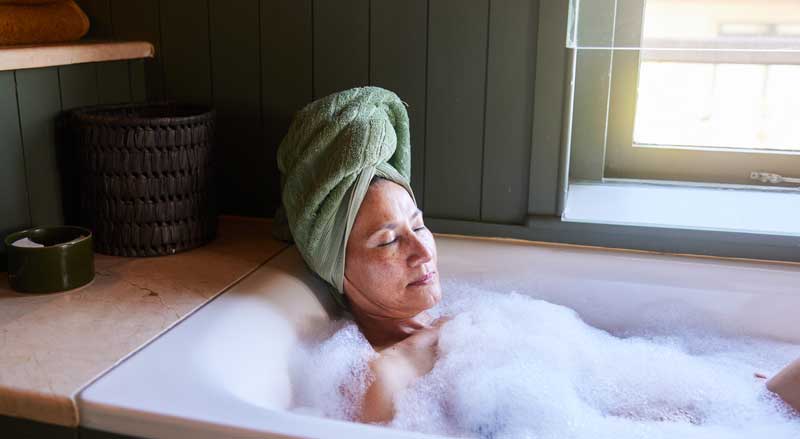Self-care simply refers to taking care of ourselves so we can be the best version of ourselves. Self-care should be part of everyone’s life. We all deserve it.
The American Psychological Association even encourages mental health professionals to practice self-care to not only to help themselves but so they can better help their patients.
Benefits of Self-care
Self-care involves every aspect of your life. It can range from the choices you make about foods to allowing yourself to express your emotions. All self-care choices involve improving your own physical, emotional, and mental well-being.
Taking care of your body is critical to any self-care plan. However, mental and emotional self-care also play a tremendous role in your physical health.
Self-care will help to reduce your anxiety, stress, depression, and frustration and even help you stay healthy. It will increase your happiness, energy, and performance—and enable you to better help others. It’s particularly important in times of stress when people tend to neglect their own needs.
Self-care is not the same for everyone and it should never feel like a burden. Start by making small changes to things you want to improve. The positive effects will inspire you to make additional changes.
Here are 6 ways to show your body self-care.
Move Your Body
The human body was meant to move, and people usually feel better once they get moving. And if there aren’t physical limitations, the more your body moves, the more it will want to move the next day.
There is a connection between body movement and:
- Improved mental health
- Better mood
- Reduced depression
Try to focus on movement—not exercise. Exercise can sound like a chore—and may lead to increased stress since you now have one more “have to do” on your list.
Simple movements like straightening up your living room, taking a walk, or watering plants aren’t part of an exercise routine, but they get your body moving and boost circulation.
If you’re not used to moving, start by trying to move for just 10 minutes at a time. This can mean walking your dog or even dancing alone in your living room.
Once you get used to moving, you may feel excited to start a new exercise routine.
Here’s how body movement promotes healthy veins.
Self-care Includes Eating Well
A healthy diet nourishes the body, provides energy, and helps prevent disease.
Unfortunately, many people equate eating well with depriving themselves of the foods they love. You may be more successful in improving your eating habits if you think about adding foods to your diet that will nourish your body and support good health.
A diet full of anti-inflammatory foods such as freshly grilled salmon and leafy green salads is not only delicious but will help you stay healthy and feel great.
Fresh blueberries and raspberries are naturally sweet and help curb cravings for unhealthy and inflammatory processed sugary foods.
Try eating superfoods that fight inflammation and you will find that your body soon craves foods these delicious foods that are actually good for you.
And stay hydrated to boost energy levels and support good mental performance.
Get Enough Rest and Sleep
Making time for adequate rest and sleep are acts of self-care. Most people need between 7-9 hours of sleep each night.
Sleep plays a key role in keeping your body and mind healthy. During sleep, your body eliminates toxins and builds your immune system.
Staying up late one night may not be harmful, but extended periods of not enough sleep can have a serious effect on your health.
Too little sleep has been associated with many health problems, including:
- Obesity
- Depression
- Stroke
- Heart attack
- Diabetes
- Poor immunity
Sleep is important to your mental health as well. Too little sleep can make it difficult to:
- Focus
- Learn
- React quickly
- Properly process emotional reactions
- Feel happy
Here’s more information about the effects of sleep on your health.
Listen to Your Body
Your body has many ways to signal that it’s tired, not feeling well, or that something is simply off.
During a busy day, it’s easy to brush aside these signals and ignore what your body’s telling you—but listening to your body is an important part of self-care.
If you fall asleep on the train during your daily commute, your body’s probably saying you’re not getting enough sleep.
Or if you’re legs painfully ache at the end of a day of lots of standing, you may have varicose veins.
Do you get headaches while reading? Perhaps you need glasses.
Here’s more about how to listen to your body to improve your health.
Support Your Own Emotional and Mental Health
Emotional self-care is all about doing things you like to do and that help you relax. It has a great impact on your physical health.
Emotional self-care involves:
- Processing your feelings in a healthy way
- Showing yourself compassion
- Seeking support from and spend quality time with friends and family
- Seeking a mental health professional when things get overwhelming
- Doing something every day that you enjoy
- Asking for help if you need it
Social self-care is all about having healthy relationships in your life.
It includes:
- Setting boundaries that are comfortable for you
- Keeping people in your life who support you
- Putting your needs first—it’s okay to say “no”
Mental self-care involves challenging yourself intellectually and keeping your brain active.
You can:
- Read a book
- Work on a hobby or puzzle
- Keep a journal
Keep Up with Check-ups
It can be tempting to skip medical checkups when you’re feeling okay or even when you’re not. But this is never a good idea.
During a check-up, your doctor might detect an illness that needs immediate treatment or advise you on important preventative steps to take against getting sick.
During check-ups you can also:
- Ask questions you have about your health
- Get caught up on vaccinations
- Learn about health screenings that are due
At NJVVC, we specialize in preventing and treating vein and vascular disease. Contact us today for a free vascular screening.






